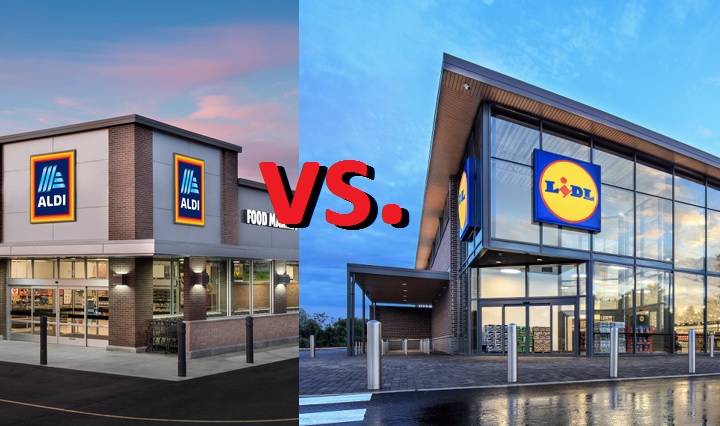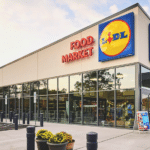
Two small-format grocers who turned their battle for business into a courtroom clash, have agreed to resolve their legal dispute. About a year and a half after ALDI filed a federal lawsuit against its upstart competitor Lidl and two former ALDI employees – which Coupons in the News was first to report back in March 2019 – all sides have agreed to a settlement, prompting ALDI to move to drop the case.
“I honestly felt that in the last 18 months I was caught in a cross-fire shoot-out between rivaling families, like the Hatfields and the McCoys,” former ALDI employee and defendant Colleen Savory told Coupons in the News.
Savory and Bruna Maraccini were ALDI coworkers who left the company to work for Lidl, which had begun opening its own ALDI-like grocery stores on the U.S. East Coast. ALDI sued them both, and Lidl itself, accusing the former employees of taking ALDI trade secrets to benefit their new employer, and accusing Lidl of knowingly benefiting from their intel. Now, all parties have agreed to dismiss the case, bearing their own legal costs and fees, subject to the terms of a confidential settlement.
ALDI, Lidl and an attorney for Maraccini did not respond to requests for comment. Savory did, saying that she is “grateful that the parties that needed to reach a resolution did so amicably.”
Describing itself as “Lidl’s biggest competitor in the retail grocery industry,” ALDI noted in its lawsuit that it has operated in the U.S. for more than three decades, with more than 1,800 stores in 35 states. Since the time of its filing, that figure has already surpassed 2,000 stores in 36 states, as ALDI continues an ambitious expansion plan. Lidl, in contrast, opened its first U.S. stores in 2017 and almost immediately struggled with its store locations and layouts, failing to achieve its goal of opening 100 stores in its first year – a milestone it reached only two months ago, more than two years behind schedule.
“In this industry, real estate strategy is king. Lidl’s historical failures with respect to its real estate decisions prove this point,” ALDI claimed in a court filing. So, ALDI alleged, hiring Maraccini, and seeking to hire her former assistant Savory, gave Lidl illicit access to their knowledge of ALDI’s superior real estate strategies, which Lidl could use to its advantage.
Maraccini served as ALDI’s Director of Real Estate in its North Carolina and Virginia regions until March 2018, when she was let go. ALDI said the terms of her severance package included a “nondisclosure/confidentiality provision” and a nine-month noncompete. Yet Maraccini went to work for Lidl less than seven months later – and, ALDI claimed, brought with her confidential information about ALDI. She also allegedly obtained additional confidential information from Savory, who was still working at ALDI and was later offered a job working alongside Maraccini at Lidl.
ALDI said a whistleblower from Lidl tipped them off to Maraccini’s actions. The tipster said Maraccini displayed “a color-coded aerial map with ALDI logos that represented the locations of current ALDI stores, stores under construction and sites for future stores.” He said she became uncomfortable when he asked whether she was supposed to have access to that information – and then she fired him two weeks later, claiming “she did not think they would work well together.”
ALDI launched an investigation, and concluded that Maraccini “retained ALDI confidential information and trade secrets in multiple forms” in violation of her separation agreement, and solicited further information from her former assistant, Savory. Savory, ALDI said, “admitted that, at Maraccini’s request, she had been sending Maraccini ALDI confidential information and trade secrets.”
Due to “Maraccini and Savory’s brazen actions,” ALDI concluded, Lidl had “its biggest competitor’s real estate strategy at its disposal,” giving it “a significant competitive advantage, which it obtained through unlawful means.” While “monetary damages alone” would not “completely compensate ALDI for the value of the lost information and/or unfair competition,” ALDI said, its lawsuit sought damages, plus the full amount of Maraccini’s salary that she earned while still subject to her noncompete agreement, and it requested “an independent review of Lidl business plans and strategies… to determine whether ALDI’s confidential information and trade secrets were used in their development and/or implementation”.
In an answer to ALDI’s complaint filed with the court, Lidl denied that it had “engaged in any unlawful conduct whatsoever.” It admitted that Maraccini began working for Lidl before her noncompete ended, but said she served in a role unrelated to her prior position at ALDI until the end of the noncompete, after which she transitioned to her new role as Director of Real Estate at Lidl’s North Carolina regional headquarters. And any alleged ALDI trade secrets that Maraccini used in her new role were “widely available,” “not adequately maintained as secret by ALDI” and “of no economic value,” and were therefore “not entitled to legal protection.”
In a separate response, Maraccini asserted that the terms of her separation agreement were “unenforceable and an unreasonable restraint of trade,” and disputed that any information she obtained or retained was “confidential, proprietary, and/or trade secret information.” Her actions were “undertaken in good faith” as part of her work responsibilities to her new employer. And the supposed smoking gun – the map she showed to the tipster – was prepared for her “by a real estate broker,” she said, and did not belong to ALDI at all.
And in her own response, Savory admitted to sending ALDI documents to Maraccini, but denied “that doing so was malicious in nature” – a position she maintained til the end. “I fully cooperated with all parties involved and as the case progressed it was clear that I never had anything to hide,” she told Coupons in the News.
Since the terms of the settlement have not been disclosed, it’s not known whether ALDI backed down, whether any of the defendants admitted fault, or whether any money changed hands. No one is publicly claiming victory, but Savory suggested that she’s satisfied with the outcome. “Though nothing can restore me whole, having my name cleared is a big step in empowering my family and I to start to pick up the pieces of our lives,” she said.
So with this dispute behind them, ALDI and Lidl can get back to business. And with any luck, from now on, this cutthroat competition will play out in the marketplace – and not in the courtroom.















